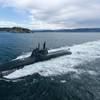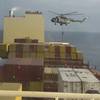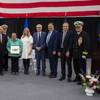U.S. Sen. Fritz Hollings announced today that he has secured a total of $29.5 million for port security efforts at the Port of Charleston as part of the fiscal year 2004 Omnibus Appropriations bill. The funding is directed to Charleston's Project Seahawk, the nation's first port security command and control center and a project Hollings helped create.
The Omnibus spending measure, approved by the Senate Thursday, encompasses the 7 appropriations bills that have yet to be approved individually. The bill will now be sent to the president for his signature.
The ranking member of the appropriations subcommittee that funds the Department of Justice and co-author of that portion of the Omnibus Appropriations bill, Hollings said he was frustrated by the lack of federal funding for the nation's port security efforts and was determined not to let South Carolina's Port of Charleston, the nation's fourth largest container port, suffer from the Administration and Congress's "lack of foresight."
"This Congress and this Administration have failed to provide the funding necessary to secure our ports, and I will not let their lack of foresight threaten security at our Port of Charleston," said Sen. Hollings, who secured $9 million for the Project in last year's appropriations. "By securing this funding, I want to make certain that our Project Seahawk at the Charleston port has the resources it needs to continue its groundbreaking work and ensure South Carolina's security."
Project Seahawk is a comprehensive effort to coordinate the port security responsibilities of the various federal, state, local and private entities charged with defending the Charleston Port. With the U.S. Attorney's office in South Carolina as the central coordinating point, Seahawk brings together agencies such as the Federal Bureau of Investigation, Immigration and Naturalization Service, U.S. Customs Service, U.S. Coast Guard, South Carolina Law Enforcement Division, local law enforcement, the State Ports Authority, and other agencies under one, port security command center.
Of the funding Hollings secured, $22 million will fund continued development of Project Seahawk and $7.5 million will help equip the Project with the latest computer hardware, software and communications infrastructure.
As the author of the nation's first federal maritime security laws - the Maritime Transportation Security Act (MTSA), Hollings has led Congress's legislative effort to secure the nation's ports, yet his repeated attempts this year to ensure federal funding for the new port security mandates have routinely been defeated, primarily along party lines.
"This government knows quite well how vulnerable our ports are to a terrorist attack," continued Hollings. "Members unanimously approved my bill to create, for the first time, federal security guidelines for port security. But despite my repeated attempts to provide the funding that's required to keep our ports safe, the Senate has voted them down twice. Add to that the fact that the Administration didn't even include port security-specific funds in their '04 budget, and it is altogether clear that this government still fails to take port security seriously."
With ports nationwide facing a variety of new security requirements under the MTSA signed into law in November 2002, funding has remained a significant obstacle to speedy implementation of upgraded safeguards. Among its provisions, the new law required every port and every waterfront facility to submit a security plan for Coast Guard approval by January 1, 2004, a requirement that the Charleston port achieved but that most ports nationally did not. The security plans must be approved and implemented by July 2004 for ports to continue operating.
The U.S. Coast Guard has estimated that it will require more than $7 billion over the next 10 years for private and public port facilities to meet the baseline mandates in the new federal port security laws. The Administration has provided less than $500 million for port security over the last 2 years.
In April, the Senate defeated a Hollings amendment to include $1 billion specifically to improve port security as part of the emergency supplemental funding for homeland security and the war in Iraq. Three months later, during Senate deliberations over Homeland Security Appropriations, the Senate voted 50-48 to defeat a Hollings amendment that would have increased the port security-specific funding in the bill to $450 million without adding to the bill's total cost.
"This should have been an easy amendment for everyone to support," Hollings said following the vote on his Homeland Security Appropriations amendment. "Every Republican and every Democrat voted for the port security authorization bill, and we all voted for the Budget Resolution to provide $1 billion for port security each year for the next 2 years. But when it comes time to provide the money, this Senate can't even deliver a fraction of what our ports need. This was not a frivolous request. This was funding for a dire and urgent need."
Sponsored Content
Chris-Marine’s solutions help to prolong engine lifetime

March 2024
 Read the Magazine
Read the Magazine

 Read the Magazine
Read the Magazine
This issue sponsored by:

Inland Waterways: Measuring Impact State by State
Subscribe for
Maritime Reporter E-News
Maritime Reporter E-News is the maritime industry's largest circulation and most authoritative ENews Service, delivered to your Email five times per week










